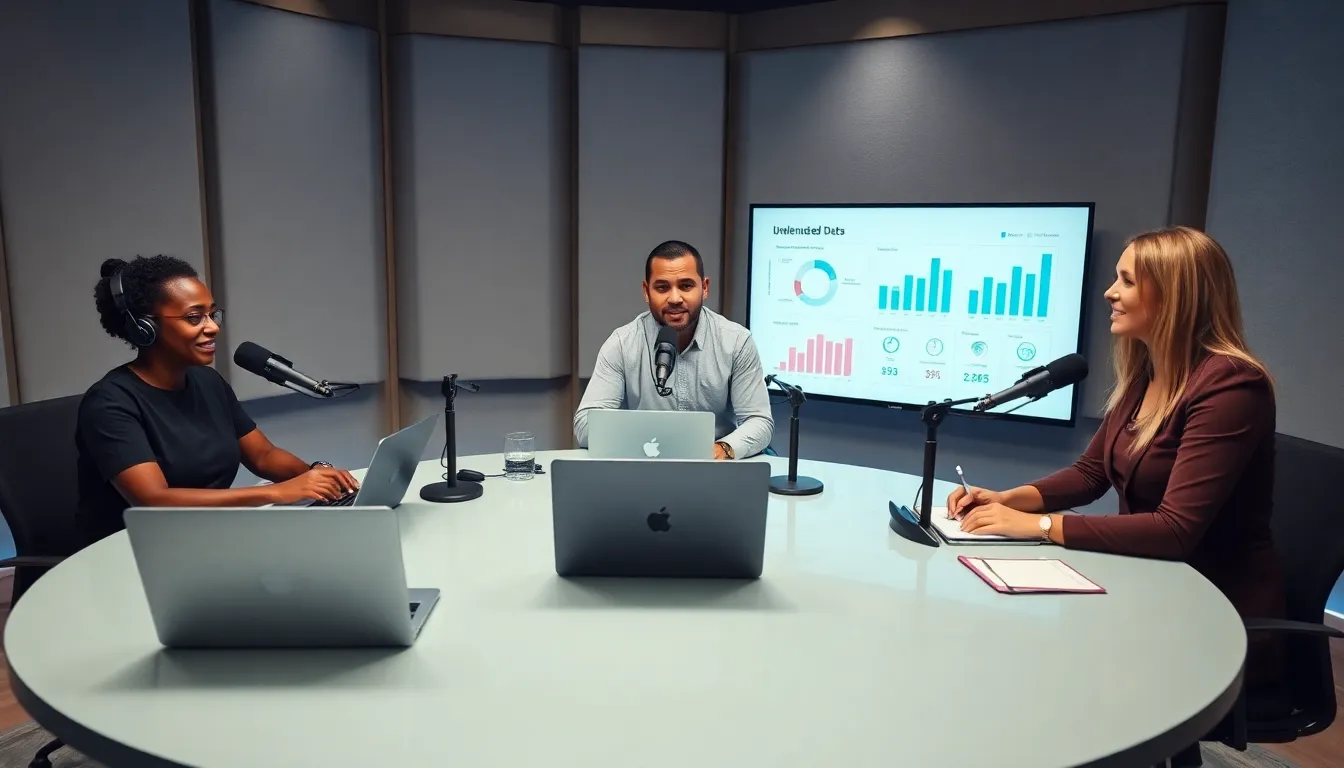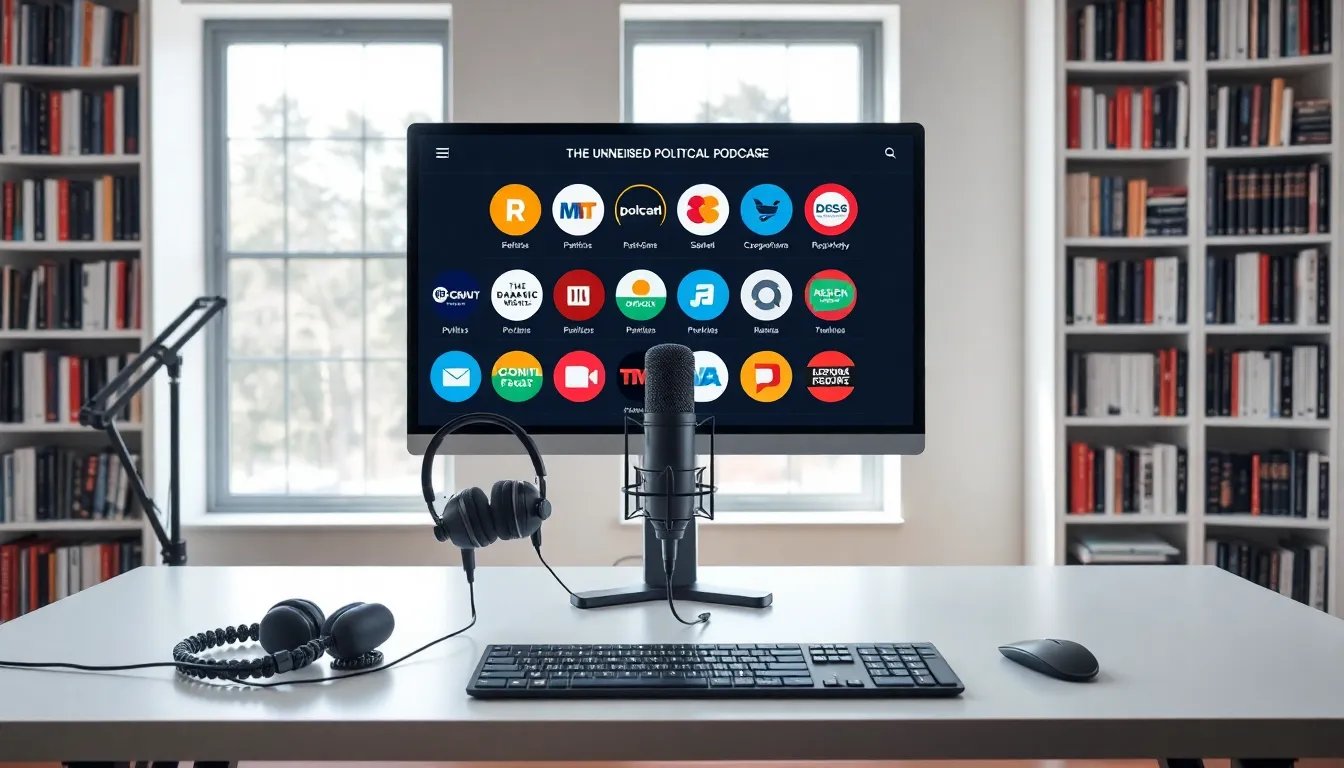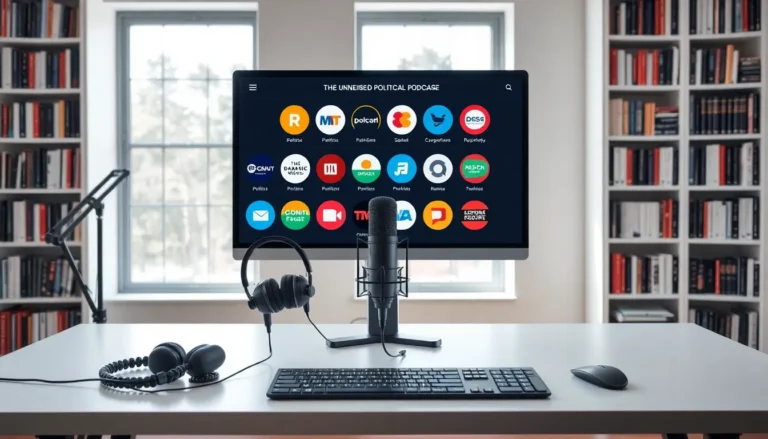In a world where political opinions can be as polarized as a debate over pineapple on pizza, finding unbiased political podcasts is like discovering a hidden gem in a thrift store. Sure, you could sift through a mountain of partisan chatter, but why not let someone else do the dirty work? There’s a treasure trove of thoughtful discussions out there, and this guide is your map. Whether you’re looking for informed insights or just want to sip your coffee without the cringe-worthy spin, we’ve got you covered.
Table of Contents
ToggleWhat Defines an Unbiased Political Podcast?

An unbiased political podcast does not lean towards one side of the political spectrum. Instead, it strives to present facts, multiple perspectives, and open dialogue that encourages critical thinking among listeners. These podcasts often apply rigorous standards of journalism, including fact-checking and balanced representation of differing viewpoints.
Also, they avoid sensationalism and refrain from hyperbolic language designed to provoke outrage. Instead, quality hosts focus on enlightening discussions that give audiences tools for forming their own opinions. When listeners tune in, they can expect a calm exchange of ideas rather than a battleground for partisan ideals.
Eventually, unbiased political podcasts provide a refreshing alternative to the heated noise surrounding politics today. They aim to inform rather than manipulate, uplift rather than divide.
The Importance of Objectivity in Political Discourse
Objectivity in political discourse is crucial for several reasons. First, it fosters a culture of respectful dialogue. In a time when political discussions often devolve into shouting matches, having a measured and objective platform allows individuals to engage without the overwhelming pressure of personal attacks. This kind of environment promotes understanding and compromises, which are essential for a functioning democracy.
Second, unbiased podcasts serve to educate listeners about different viewpoints. They encourage critical thinking and healthy skepticism, helping individuals to navigate the often murky waters of political knowledge. When people are exposed to a range of opinions and perspectives, they are better equipped to form their own well-rounded viewpoints.
Also, in a world driven by information overload, objective discourse becomes an oasis of clarity. Listeners appreciate having the chance to hear straightforward analyses, free from the clutter of sensational headlines. This can be particularly beneficial during election cycles when bias can cloud objective reporting.
Top Unbiased Political Podcasts to Follow
For those seeking recommendations, here are some standout unbiased political podcasts that truly deliver:
- The NPR Politics Podcast – This show features NPR political reporters who provide insights into the latest news, trends, and upcoming events, all while maintaining a balanced perspective.
- Pod Save America – Although hosted by former Obama staffers, the show consistently aims to present multiple viewpoints while addressing key political issues of today.
- The Weeds – Produced by Vox, this podcast dives deep into policy issues and makes a concerted effort to present nuanced arguments rather than oversimplified narratives.
- FiveThirtyEight Politics – This podcast employs rigorous statistical analysis and fact-checking, offering a comprehensive look at political trends while steering clear of partisan bias.
- Left, Right & Center – A lively, debate-focused podcast that involves representatives from the left, right, and center, encouraging a civil discourse that respects differing views.
These podcasts not only inform but also challenge listeners to think critically and engage constructively.
How to Evaluate the Unbiased Nature of a Podcast
The Role of Host Backgrounds and Perspectives
One critical factor to evaluate when determining a podcast’s unbiased nature is the host’s background. By understanding the hosts’ previous experiences and viewpoints, listeners can assess potential biases. Ideally, podcasts with diverse hosting teams provide a broader range of perspectives and insights, leading to more balanced discussions.
Listener Engagement and Community Feedback
Another good approach is exploring listener reviews and community feedback. A podcast that openly engages its audience, encourages questions, and adapts based on constructive criticism usually maintains its focus on objectivity. If a significant number of listeners note bias, it may be worth taking those comments seriously.
The Influence of Sponsorships and Advertisements
Finally, consider how sponsorships and advertisements can affect the integrity of the content. If a podcast relies heavily on funding from specific political organizations or entities, that financial influence may skew its perspective. Be cautious of podcasts that seem overly promotional or fail to disclose potential conflicts of interest.
Tips for Finding New Unbiased Political Podcasts
Finding new unbiased political podcasts can feel daunting, but here are some helpful tips to make the search easier:
- Browse Recommended Lists: Look into curated lists of top political podcasts on reputable sites: these often highlight quality programs that prioritize accuracy and fairness.
- Join Online Communities: Engaging in forums or groups dedicated to political discussions can lead to personal recommendations based on real listener experiences.
- Check Ratings and Reviews: Listening to a sample episode and reading ratings can help gauge whether a podcast aligns with your standards for objectivity.
- Experiment with Various Formats: Some listeners may prefer roundtable discussions, while others might enjoy single-host analyses. Trying out different formats can uncover hidden gems that resonate with your interests.
- Listen for a While: Sometimes, giving a podcast a few episodes is necessary to gauge its overall tone and objectivity. Consistency over time is often a reliable indicator of unbiased content.





